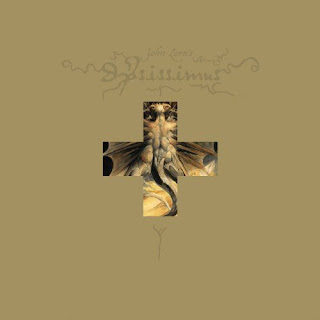 (Painiac Records, 2006)
(Painiac Records, 2006)If the slow, cold crawl of death-plated doom bores you, move on. Wormphlegm don’t make nuanced prog-blessed neo-black tech-jazz proto-folk metal, or whatever it is the hippies want to hear these days. Tomb of the Ancient King delivers a precise realization of its title, assuming that said tomb is an unlit, cathedral-sized cavern and that ancient king is a pissed-off Balrog flanked by shrieking, rotting terrors, and is seriously not dead.
The dark, one-note pounding on a piano key sets the stage for Tomb’s first half-hour (all one track). As razor chords tear through the shadows, they are paired with a trebly melody that stretches like Romero zombie flesh being ripped from the bone. The vocals also travel in pairs: piercing ghost howls dart always in the high chambers above the rumbling, unintelligible yeti roars. The gore-drenched din mostly follows unsurprising (though not unchanging) paths, with rhythms and riffs speeding up and turning left once in a while but never really finding their way deeper or closer to the edge of the song’s light-starved labyrinth. The monochrome production sets this work apart from these Finns' synth-stained other doom band, Tyranny (also worth checking out, though somewhat less engaging than Tomb).
After thirty minutes of “Epejumalat monet tesse muinen palveltin caucan ja lesse,” the title track and closer “Return of the Ice Age and the Tortyrant” seem bite-sized in comparison, at only 13 minutes and 17 ½ minutes respectively. They don’t stray far from the blueprint laid out in the first track, but mash similar ideas into new forms. Drum patterns in “Tomb of the Ancient King” become more varied and evocative, helping the band sound more like they’re playing a song rather than exploring a haunted mine. At one point, the torturous bellowing drops closer to Gozer snarls. “Return” distends and shrivels over its runtime with bent, decaying chords and wobbly rhythmic heaving. The track eventually gives out, with the album not so much finishing as exhausting itself after an hour of unrelenting punishment.
With all the variations on bleak doom cropping up in 21st century metal, some will say that Tomb is beating a dead horse. But when so much stinking, gleaming viscera erupts from an animal when it is beaten thus, I, and Wormphlegm, say: Why not?



